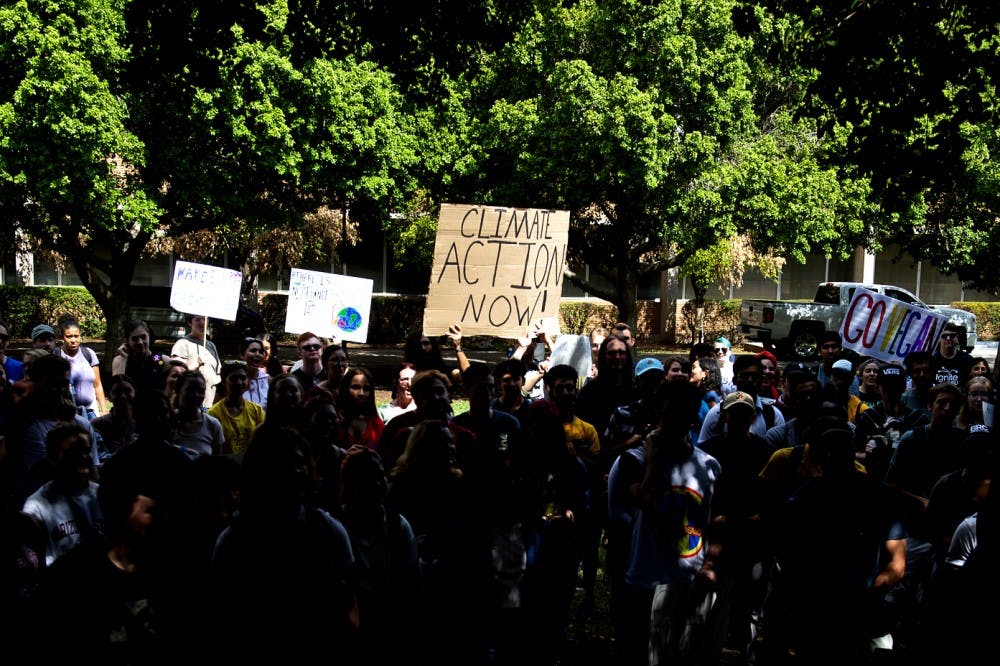A group of ASU faculty are working to closely examine the media’s portrayal of climate change and the effectiveness of media in encouraging people to act.
The project, titled “Apocalypticism, Climate Change and the American Imagination,” will produce a series of articles and think-pieces centered around climate change, and how the general public responds to apocalyptic thinking.
Apocalypticism is the expectation of an apocalypse or "a doctrine concerning an imminent end of the world," according to Merriam-Webster.
Apocalyptic thinking, in turn, can place a time limit on the public's perception of climate change, adding a call to action in the climate crisis conversation, the researchers said.
Steven Beschloss, one of the leaders of the project, said the idea of some kind of inevitable apocalypse has always been present in the minds of Americans, but has recently been associated with the way people talk about climate change.
Beschloss is the senior director for narrative development at ASU and a professor of practice in the Walter Cronkite School of Journalism and Mass Communication.
An article published in Times Higher Education and Medium, written by Beschloss and religion and technology professor Gaymon Bennett, states that this research project is intended to better grasp the kinds of apocalyptic narratives that have shaped American thinking and action.
“People having notions about the end of times — whether that was something exciting and even entertaining, or whether it was an idea of calamity and a dire future that caused people to be overwhelmed," Beschloss said. "We felt, sort of in both cases, that it leads to people doing nothing."
He said there has recently been a spike in catastrophic rhetoric replacing passive talk about climate change in the media.
One example is The Guardian's style-guide change, urging reporters to use the words "climate crisis" or "climate emergency" rather than "change."
Beschloss said he does not believe there is one right way to approach the conversation about climate change, but believes media outlets should focus on getting the news out in a way that is both truthful and encourages as many people as possible to act.
“Some people, if you raise an alarm and it’s particularly scary, it might cause them to act," he said. "In other cases, they may be alarmed and find it scary and then just turn the other way and do nothing."
Beschloss said that while he believes the terms "crisis" and "emergency" may be the most accurate ways to describe the current state of the planet, the most important goal right now should be "for people, in whatever way is comfortable, to recognize the urgency."
There is a noticeable generational divide in the way that people talk about the climate crisis, he said.
“I mean it’s truly alarming that you have a lot of older people who might say, ‘I’ll be gone,’” Beschloss said. “I think for a lot of people, they’ve been led to think that the problem is sometime in the future, and that often times can lead people to not pay attention to what’s actually going on right in front of them.”
ASU's Global Futures Laboratory is also supporting the project.
Peter Schlosser, the vice president and vice provost of the Global Futures Laboratory, said the goal of the University lab is to “not just understand how the world works and what kind of pressures we are under, but also to engage in finding options for getting out from underneath that pressure."
Schlosser said that apart from Beschloss’ “Apocalypticism” project, the Global Futures Laboratory has created formal structures to raise awareness and inform the public about ways they can help combat climate change.
One of these structures is the Narrative Storytelling Initiative, directed by Beschloss.
Beschloss said the purpose of the Narrative Storytelling Initiative, in relation to his upcoming “Apocalypticism” project, is to use different types of storytelling to provoke action against climate change.
Hilairy Hartnett, an associate professor and sustainability scholar at ASU, said that although talk of climate change can often seem “doom and gloom,” she has witnessed a desire in her students to do all they can to stop climate change.
“I think that young people, our students here at ASU, they get it,” Hartnett said. “They really care and want to make a difference, and I think that’s one of the most positive things we can say right now is that young people who are just at the beginning of their careers are really interested in this problem.”
Clarification: The previous version of this article included a medium post with the study. The study was also featured in Times Higher Education, the story has been updated to reflect this change.
Reach the reporter at erfontan@asu.edu or follow @EndiaxRain on Twitter.
Like The State Press on Facebook and follow @statepress on Twitter.




